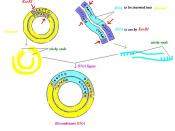Nowadays, we are being constantly fed with the prophecy that biotechnology is the next revolutionary "wave" replacing information technology, which had changed the way we lived in the past 50 years. The past decade has seen scientists making significant breakthroughs in this field to initiate the current biotechnological hype. Scientists from all around the world are working desperately at sub-atomic level to uncover yet another mysteries unknown to man, to date. One defining achievement was the cloning of a sheep named "Dolly" by Dr. Ian Wilmut of Roslin Institute in 1996. This historic success debunked all previous biology myths, which termed cloning as nothing but a fantasy. Now, it is possible for us to use the cells from an adult organism to create another genetically identical organism. Suddenly it seems like science fiction story of cloning humans has become not-so-distant possibility.
Biotechnology is the application to industry of advances made in the techniques and instruments of research in the biological sciences.
The practical use of DNA and genes, called genetic technology or gene science is one of the fastest growing areas of research in biotechnology. The growth of the field of biotechnology is, undoubtedly, dependent on the development of genetic engineering. Scientists have been able to make use of the fact that DNA is the same and works in the same way, in all living things. This makes genetic engineering possible. Genetic engineering involves transferring a 'useful' gene from one species into another to produce a beneficial feature. Modifying the DNA "message" in this way may also, one day, provide a cure for some inherited diseases in the form of "gene therapy", which replaces a faulty gene with a healthy one. Beneficial substances that have been produced with the help of genetic engineering include human interferon (a natural virus-fighting substance),


